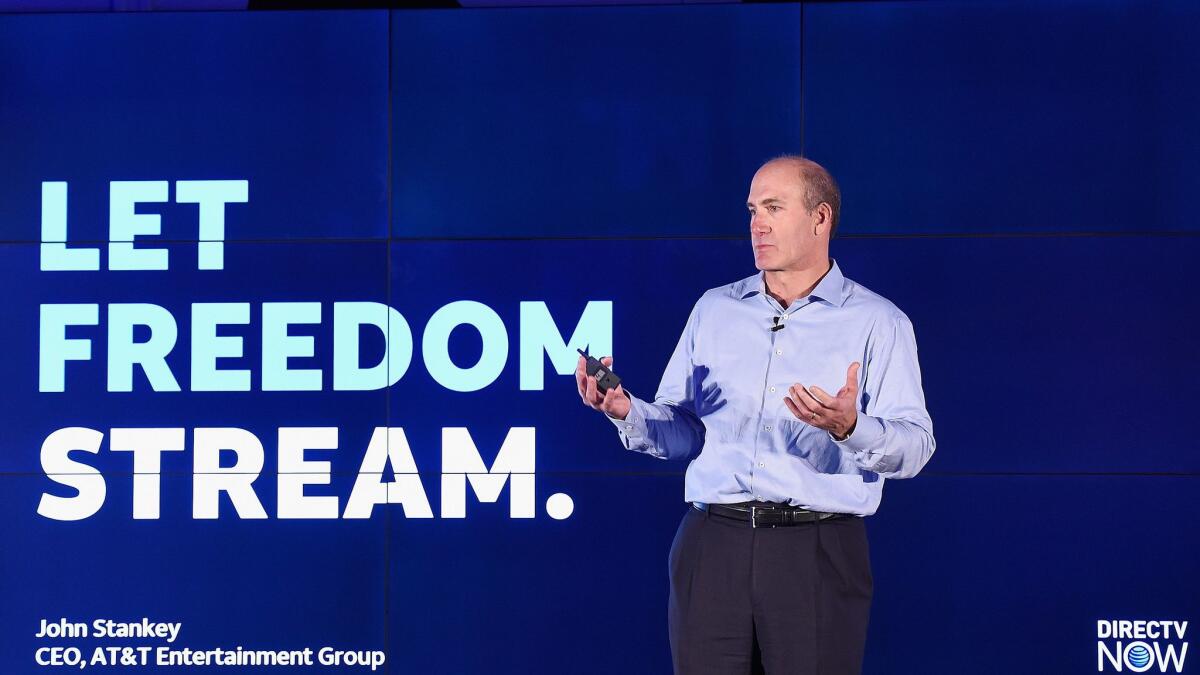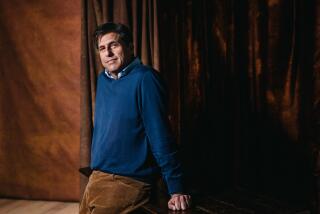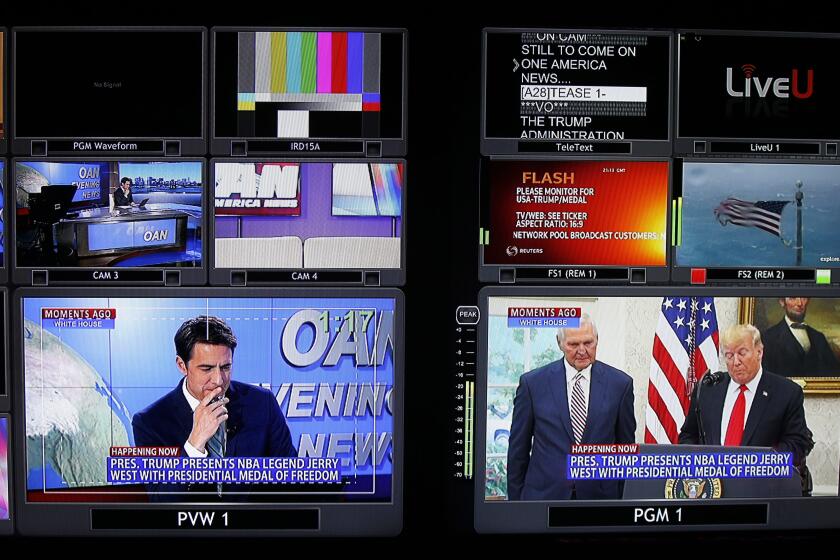AT&T veteran, John Stankey, is expected to lead entertainment operations after Time Warner takeover

Telecommunications colossus AT&T already is making plans for its management structure after it completes its proposed $85.4-billion takeover of media giant Time Warner Inc., including expanding its operations in Los Angeles.
It is widely expected that AT&T will turn to 30-year phone company veteran John Stankey to run the movie and television business once the Time Warner deal closes. Stankey, 54, is a trusted lieutenant of AT&T Chief Executive Randall Stephenson and he currently leads AT&T’s Entertainment group in El Segundo, which includes satellite television service DirecTV.
Dallas-based AT&T has begun relocating 300 high-level executives from its Dallas headquarters and operations in Atlanta to work at the El Segundo campus, where Stankey is based. The company wants Los Angeles, where 12,000 AT&T employees already work, to become a more vibrant corporate center.
The gargantuan Time Warner merger was announced in October, and the U.S. Department of Justice antitrust division has been reviewing the combination to make sure that it won’t choke competition in the media and telecommunications industries. If the deal is approved by Justice Department regulators and U.S. Atty. Gen. Jeff Sessions, the telecommunications giant would control such prized media assets as CNN, HBO, TBS, TNT, Cartoon Network and Warner Bros. film and television studio.
Observers expect the Justice Department to approve the deal this year, perhaps as early as September.
AT&T sponsored a conference Friday and Saturday for software developers on the Warner Bros. studio lot in Burbank as the company takes strategic steps to raise its profile in the entertainment community.
“L.A. is a real critical place for us,” Stankey, who currently serves as chief executive of AT&T Entertainment, said in an interview this week. “I have bought in — hook, line and sinker — to the Silicon Beach entertainment nexus — and this is why we want to be here. It is a software-driven world.”
Bloomberg News first reported that AT&T plans to break itself into two independent companies once the merger is finalized — phone operations in one group and media and entertainment in the other.
Stankey would reportedly run the entertainment operations, including the Time Warner properties, while John Donovan, another AT&T veteran, would run the phone service.
AT&T on Friday said “no decisions on [organizational] structure or leadership have been finalized.”
Stankey also said those decisions were still pending, in part, because the Justice Department has rules that restrict cooperation and sharing of information between two companies before a merger is complete.
“Making final decisions on organizational structure and what we are going to do is — believe it or not — something that is done very, very, late in the process,” Stankey said. “We don’t have the access to all the information and insights that we need to be able to make those decisions until we are further along in the process.”
However, Time Warner Chairman and Chief Executive Jeff Bewkes is expected to step down from his leadership role as soon as AT&T takes over the venerable media company. Bewkes has said he will stick around as long as AT&T needs his help with the integration, but executives within AT&T and Time Warner believe that AT&T quickly will begin calling the shots.
For example, after AT&T assumed control of DirecTV in 2015, Stankey immediately replaced the former DirecTV CEO, Mike White, and there was an exodus of longtime DirecTV executives.
Dividing the company into two distinct business units would follow a model used by Philadelphia cable giant Comcast Corp. when it acquired NBCUniversal in 2011. Comcast Chief Executive Brian Roberts turned to his trusted deputy, Steve Burke, to run NBCUniversal in New York and tapped another executive to oversee the cable television and broadband Internet operations.
It is unclear whether dividing the company would also satisfy concerns that are expected to be raised by regulators, such as how AT&T would safeguard personal information about phone customers as well as ensuring editorial independence at CNN.
CNN has become a particular sore spot for President Trump, who frequently criticizes CNN’s coverage of him. And before the election, Trump said his administration would block the proposed merger because it would consolidate too much power in a single company, although people close to the companies believe that Trump now is more comfortable with the deal.
Another area of concern is that AT&T’s phone operations are highly regulated, and frequently have issues pending before state and municipal governments, including where the company can locate its cellphone towers. Separating the two spheres could help to insulate CNN, one of the nation’s premier news organizations, from meddling by politicians.
Stephenson will remain chairman and chief executive of AT&T once the deal is finalized, AT&T said Friday.
There is a wild card in the Justice Department review of the AT&T-Time Warner deal. The U.S. Senate has not confirmed Trump’s pick to run the antitrust division, Makan Delrahim, who would become the assistant attorney general under Sessions. Delrahim was nominated in March and a Senate subcommittee approved his appointment by a 19-1 vote in June. He is now awaiting the approval of the full Senate.
Until he is confirmed, Acting Assistant Atty. Gen. Andrew Finch is overseeing the AT&T merger review.
Meanwhile, opponents are mobilizing to try to persuade regulators to block the deal.
“There’s a growing discomfort across the political spectrum of consumers that amassing more power in the hands of fewer media and cable giants will drive up prices and limit choices,” said Gene Kimmelman, chief executive of the consumer rights group Public Knowledge. “It’s time for antitrust enforcers to do their job and stand up to monopolistic dangers like the AT&T-Time Warner merger.”
More to Read
Inside the business of entertainment
The Wide Shot brings you news, analysis and insights on everything from streaming wars to production — and what it all means for the future.
You may occasionally receive promotional content from the Los Angeles Times.







